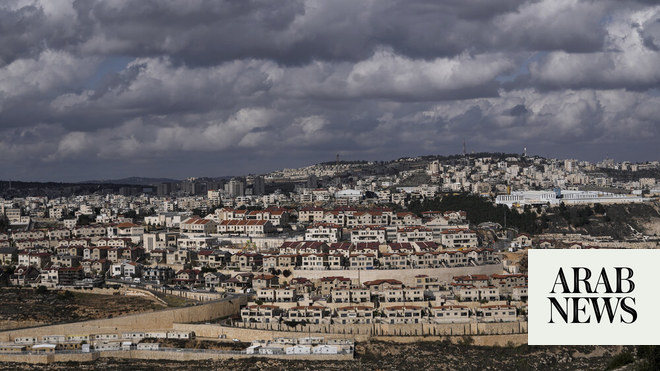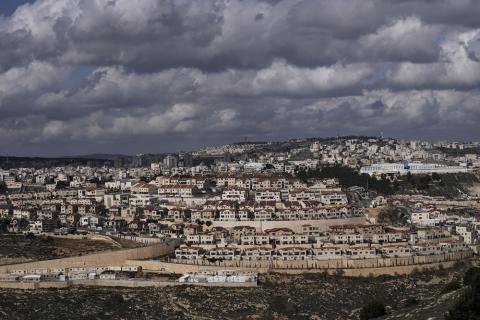
The move comes just a week after Israeli and Palestinian officials met in Egypt in an effort to calm rising tensions ahead of Ramadan
The anti-settlement Israeli group Peace Now publicized the construction bids on Friday
RAMALLAH: Israeli Prime Minister Benjamin Netanyahu’s far-right government has authorized construction bids for more than 1,000 new homes in Jewish settlements in the occupied West Bank and East Jerusalem.
The move comes just a week after Israeli and Palestinian officials met in Egypt’s southern resort city of Sharm El-Sheikh in an effort to calm rising tensions ahead of Ramadan.
Following the meeting, Israel repeated a pledge made at a similar February summit in Aqaba, Jordan, to temporarily freeze the approval of new settlement units in the occupied West Bank.
The anti-settlement Israeli group Peace Now publicized the construction bids on Friday, and said that this was “yet another harmful and unnecessary construction initiative.”
It accused the Netanyahu government of “trampling on the possibility of a future political agreement, and on our relations with the US and friendly countries.”
It added that the government had issued tenders to build 1,029 homes in the Palestinian territories.
The Israel Land Authority published the tenders earlier this week for the construction of 940 homes in the West Bank areas of Efrat and Beitar Illit, along with 89 homes in the Gilo settlement, which lies over the 1967 line on the southern edge of the contested capital of Jerusalem.
The large settlement of Efrat sits deep in the West Bank, near the Palestinian town of Bethlehem.
Palestinians see these lands, captured by Israel in the 1967 war, as part of a future independent state alongside Israel — a long-standing international goal.
Peace Now said: “The most extreme right-wing government in Israel’s history is trampling not only on democracy, but also on the possibility of a future political agreement, and on our relations with the United States and friendly countries.”
It added that “lies and violations of commitments are a sure way to turn Israel into an isolated state.”
The Palestinian Foreign Ministry saw the move as a betrayal of Netanyahu’s vow to freeze settlement construction, showing “official disregard for American and international reactions.”
It criticized approval of the tenders as “a blatant departure and deliberate sabotage of the understandings that were reached between the Palestinian and Israeli sides under American auspices.”
It added: “This also confirms that the Israeli government is continuing to commit the crime of settlement expansion and deepening apartheid, intending to close the door to any opportunity to embody the Palestinian state on the ground.”
Khalil Tafakji, an expert on settlement affairs, told Arab News that what members of the Israeli government said about settlements was one thing; what they did was something else.
He added that Israel was seeking to expand the settlement bloc within the Greater Jerusalem project, which was equal to 10 percent of the West Bank area.
Tafakji said that as part of the project, the Israeli authorities were expanding the tunnels in the Beit Jala area and digging a tunnel near the Qalandiya checkpoint to connect the settlements.
More than 500,000 settlers live in the West Bank, 230,000 in East Jerusalem, Tafakji added.
The Palestinians consider the presence of Israeli settlements as an existential threat to their dream of establishing a geographically contiguous Palestinian state alongside Israel.
The Israeli government has said it aims to entrench military rule in the West Bank, boost settlement construction, and erase differences for Israelis between life in the settlements and within the country’s internationally recognized borders.
In another development, dozens of Palestinian workers in the Beitar Illit settlement, west of Bethlehem, are being forced to pay $6 to the authorities on a daily basis to enter and work. The number of Palestinian workers involved is estimated at 2,000.
The Beitar Illit Development Company says the money is paid to help protect the settlement.
Ahmad Atibi, a Palestinian member of the Israeli parliament, raised the issue in the Knesset, but the situation has not been addressed.
Meir Rubinstein, Beitar Illit’s mayor, on March 14 prevented Palestinians from boarding buses, even if they had Israeli IDs or official permits, and ordered passengers to disembark. He mocked them, saying he knew the step was illegal.
About 30,000 Palestinian workers without Israeli permits are working inside West Bank settlements.












